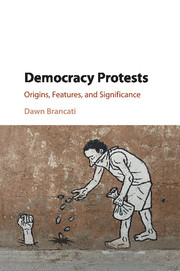Book contents
- Frontmatter
- Dedication
- Contents
- List of Figures
- List of Tables
- Acknowledgments
- 1 Introduction
- 2 Characteristics of Democracy Protests
- 3 Relating Economic Crises to Democracy
- 4 Analyzing the Rise of Democracy Protests
- 5 Analyzing Elections as Trigger Events
- 6 Historical Trends in Government Responses
- 7 Analyzing Political Accommodation
- 8 Historical Trends in Democratization
- 9 Analyzing Democratization
- 10 Conclusion
- Appendix: Data and Measures
- References
- Index
7 - Analyzing Political Accommodation
Published online by Cambridge University Press: 05 September 2016
- Frontmatter
- Dedication
- Contents
- List of Figures
- List of Tables
- Acknowledgments
- 1 Introduction
- 2 Characteristics of Democracy Protests
- 3 Relating Economic Crises to Democracy
- 4 Analyzing the Rise of Democracy Protests
- 5 Analyzing Elections as Trigger Events
- 6 Historical Trends in Government Responses
- 7 Analyzing Political Accommodation
- 8 Historical Trends in Democratization
- 9 Analyzing Democratization
- 10 Conclusion
- Appendix: Data and Measures
- References
- Index
Summary
In this chapter, I analyze the conditions under which governments are likely to accommodate democracy protests and the importance, in particular, of economic crises to this result. Although the challenges for governments of retaining power in more open and competitive elections are greater in crisis periods, governments, I argue, are more likely to accommodate democracy protests in these periods than in noncrisis periods, because democracy protests are likely to be much larger in the case of the former than in the case of the latter. Large protests pose a greater threat to governments than small ones because they are more likely to attract the support of foreign actors, and more importantly, the support of the political, business, and military elite within countries.
To test this argument, the statistical analysis to follow builds on previous analyses, which demonstrated a link between the severity of economic crises and the size of democracy protests, by examining the relationship between the latter and the likelihood of governments to accommodate democracy protests. The analysis includes all 310 democracy protests that occurred in 92 states between 1989 and 2011. In brief, the analysis finds that governments are more likely to make political concessions and be removed from power in response to large protests. Other factors affecting the extent to which protests pose a threat to governments, including the tactics and demands of the protests, as well as the level of economic inequality in countries, are for the most part not significantly associated with the likelihood of governments to accommodate democracy protests.
SIZING UP PROTESTS
Governments may accommodate democracy protests politically in one of two ways. The first is by making political concessions to the protests and the second is by stepping down from power. Often, governments do both, as is frequently the case when governments step down from power. The principal characteristic distinguishing protests that governments accommodate politically in either of these ways is size, that is, the number of individuals who take part in the protests.
Political Concessions
Political concessions affect the nature and structure of regimes.
- Type
- Chapter
- Information
- Democracy ProtestsOrigins, Features, and Significance, pp. 127 - 143Publisher: Cambridge University PressPrint publication year: 2016



